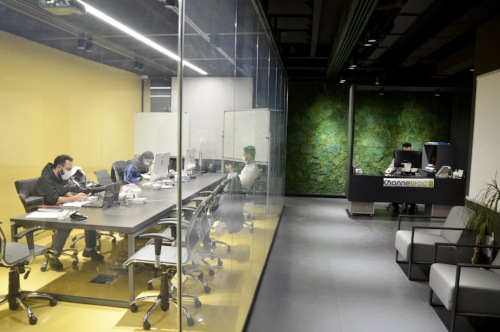In today’s fast-paced business environment, the ability to manage and harness organizational knowledge can be the difference between staying afloat and sinking. As companies become more data-driven, the accumulation, organization, and dissemination of knowledge becomes critical. A knowledge management system can serve as the backbone for this process, ensuring that vital information is stored, accessed, and used effectively. In exploring the advantages of such systems in the workplace, businesses can better appreciate their potential impact. Keep reading to discover the transformative power of knowledge management.
Understanding KMS and Its Role in Modern Workplaces

Alt text: Professionals collaborating to implement the best knowledge management system for their organization.
KMS is a sophisticated platform designed to collect, organize, and share information within an organization. They consolidate disparate sources of information, making it accessible to the right people at the right time. In essence, a KMS ensures that valuable company insights and data do not remain siloed within departments or with individual employees. By doing so, it converts individual knowledge into a collective asset.
The role of a KMS is increasingly crucial as businesses contend with the accelerating volume and complexity of information. These systems not only support knowledge retention in the face of employee turnover but also enable businesses to respond swiftly to market changes. A robust KMS acts as a dynamic repository where the company’s intellectual property can be safeguarded and perpetually enriched.
Furthermore, these systems are integral in nurturing a culture of learning and knowledge-sharing. With the array of collaborative tools embedded within them, employees can easily contribute to and benefit from the collective expertise. This aggregation of knowledge promotes a more informed and skilled workforce capable of tackling complex tasks with greater competence.
Facilitating Innovation and Continuous Improvement With Collaborative Knowledge Sharing

Alt text: Employee implementing a knowledge management system for his organization to improve knowledge sharing.
Innovation is often the product of collaborative effort, and a KMS serves as a crucible for creative thought. When knowledge is hoarded or compartmentalized, it stifles innovation. Conversely, actively shared knowledge fosters an environment where new ideas can flourish and evolve through collaboration.
A KMS encourages an open exchange of ideas, allowing for constructive feedback and iterative development. With historical data and prior experiences documented within the system, employees can build upon previous initiatives. This iterative learning process leads to continuous improvement and avoids the repetition of past mistakes.
The cross-pollination of ideas that a KMS enables is also instrumental in uncovering novel approaches to existing problems. When information is readily sharable, employees from diverse backgrounds and with various skill sets can contribute unique perspectives. This diversity of thought is often the bedrock of breakthrough innovations.
Leveraging Organizational Wisdom to Drive Strategic Decision-Making
Strategic decision-making is greatly influenced by the availability and quality of information at hand. A KMS serves as a repository of organizational wisdom, amassing data insights that inform key business decisions. Leaders can leverage this cumulative intelligence to chart informed strategic courses.
In an environment where historical successes and failures are meticulously recorded, management can identify patterns and trends that guide decision-making. These insights gained from a KMS can reveal opportunities for optimization and highlight areas where innovation is needed. Essentially, having a comprehensive view of the organization’s knowledge assets supports more strategic and less speculative decision-making.
Moreover, a KMS can be transformative in risk management. By analyzing past experiences and outcomes, businesses can better anticipate potential pitfalls and proactively craft contingencies. This foresight, derived from accumulated knowledge, is critical in navigating complex and uncertain markets.
Measuring the Impact of Knowledge Management on Employee Engagement and Retention
The implementation of a KMS can also have a profound impact on employee retention. A KMS facilitates access to necessary information, supporting employees in their roles and contributing to job satisfaction. When individuals feel equipped to perform their duties, they are more likely to be engaged with their work.
Furthermore, a knowledge-rich environment created by a KMS nurtures professional development. Employees have the opportunity to learn continually and upscale their expertise. This emphasis on personal growth can positively influence an employee’s decision to remain with a company, thus reducing turnover rates.
Altogether, the diverse benefits of implementing a KMS in modern workplaces are clear: from boosting productivity and fostering innovation to underpinning strategic decisions and enhancing employee engagement. By effectively managing and utilizing their wealth of knowledge, organizations can solidify their footing in a competitive market and build a dynamic, learning-oriented workforce that can adapt and thrive in the face of continuous change.



